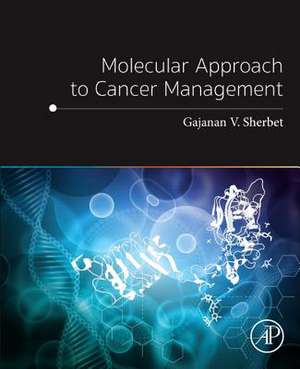Molecular Approach to Cancer Management
Autor Gajanan V. Sherbeten Limba Engleză Paperback – 20 iun 2017
This book is the only unique volume with coverage of topics that target therapy. As such, it is a valuable source for cancer researchers, molecular oncologists and members of the biomedical field who are interested in knowing more about molecular approaches to cancer therapy.
- Covers all relevant topics with a defined aim of targeted therapy
- Encompasses the basic aspects of cancer invasion and metastasis
- Discusses signaling systems operating in normal cells and their deregulation in cancer cells
- Directs attention to the foci in signaling systems that can be targeted with a new and conventional drug-based approach
Preț: 845.71 lei
Preț vechi: 1060.21 lei
-20% Nou
Puncte Express: 1269
Preț estimativ în valută:
161.82€ • 168.97$ • 133.63£
161.82€ • 168.97$ • 133.63£
Carte tipărită la comandă
Livrare economică 08-22 aprilie
Preluare comenzi: 021 569.72.76
Specificații
ISBN-13: 9780128128961
ISBN-10: 0128128968
Pagini: 352
Dimensiuni: 191 x 235 x 21 mm
Editura: ELSEVIER SCIENCE
ISBN-10: 0128128968
Pagini: 352
Dimensiuni: 191 x 235 x 21 mm
Editura: ELSEVIER SCIENCE
Public țintă
cancer researchers;oncologists;molecular oncologistsCuprins
1. Modulation of growth factor signaling in targeted therapy: Role of the epidermal growth factor family and their receptors2. The TGF-B family accessory type III receptor function in cancer progression3. Insulin-like growth factor signaling as a target to control tumor progression4. Angiogenesis in neoplasia and antiangiogenesis strategy in the control of tumor growth and metastasis5. On the trail of TRAIL in tumor growth and angiogenesis6. Hedgehog (Hh) signaling in EMT, CSCs and angiogenesis7. Hedgehog is involved in angiogenic signaling by angiopoietin-18. Hippo signaling in cell proliferation, migration and angiogenesis9. Tumor suppression and inhibition of angiogenesis by TXNIP10. Suramin and polysulphonated naphthylureas as angiogenesis inhibitors 11. Quercetin inhibits growth factor signaling: suppresses angiogenesis and cell migration in vitro12. Selenoproteins in cancer control13. Inhibitor of DNA binding proteins in angiogenesis14. Are there gains to be made in exploring anthrax lethal toxin (LeTx) as a tumor and an angiogenesis inhibitor?15. Small molecule inhibitors of angiogenesis and cell proliferation16. Control of tumor growth and angiogenesis by thalidomide and its analogues17. Endogenous inhibitors of angiogenesis18. Metformin and its antitumor attributes19. Statins in cancer biology20. The HMG (High mobility group) proteins in cancer progression21. MTAs in EMT activation and tumor and metastasis promotion22. S100A4 has potential benefits as a therapeutic target23. Notch Signaling in carcinogenesis24. Canonical and non-canonical activation of NF-κB in tumorigenesis25. Stem cells in cancer therapy26. Notable approaches to cancer immunotherapy
